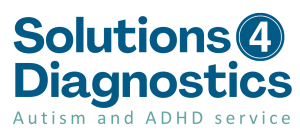Delivering virtual assessments for autism and ADHD in England

Autism
Autism is a spectrum condition and affects people in different ways. Like all people, autistic people have their own strengths and weaknesses.
Autism is a lifelong developmental disability which affects how people communicate and interact with the world. More than one in 100 people are on the autism spectrum and there are around 700,000 autistic adults and children in the UK.
Autism, also known as Autism Spectrum Disorder (ASD), is a special way that some people’s brains work differently. It can make things like talking, making friends, and understanding feelings a bit tricky. People with autism might have trouble knowing how others feel or knowing when to talk or stay quiet. They might find it hard to understand social cues or expressing their feelings. An autism assessment can help people to understand themselves better and help them find the right kind of support and help they need.
Signs and symptoms of autism vary widely. While people with autism often experience the world differently from others and can share some common challenges, everyone is unique and faces different difficulties. This is why autism diagnosis should only be carried out by experts.
Symptoms of autism usually start in early childhood and persist into adulthood, although the way in which these symptoms present themselves can change as a person gets older.
Although many people are diagnosed as children, this is not true for everyone. Many people only notice autistic traits as they get older, and an adult autism assessment can help in this case.
Autism can sometimes be different in women and men.
Autistic women may:
- have learned to hide signs of autism to ‘fit in’ – by copying people who don’t have
- be quieter and hide their
- appear to cope better with social
- show fewer signs of repetitive
This means it can be harder to tell you’re autistic if you’re a woman.
Social issues
Autistic people may have difficulty understanding social cues, making friends, and fitting into social situations.
Anxiety
Many autistic individuals experience heightened levels of anxiety due to sensory sensitivities, social challenges, and unpredictability.
Misunderstandings
Autistic individuals may be misunderstood because their communication and social behaviours can differ from what is expected.
Routine
Establishing and maintaining a strict routine is often important for autistic people as changes to the routine can cause distress.
Expression
People with autism may struggle to express their thoughts and feelings verbally or nonverbally.
Introversion
Many autistic people tend to be introverted, finding comfort in quieter settings or on their own.
Eye contact
Maintaining eye contact can be a challenge for autistic people due to sensory overload or difficulties with social engagement.
Speech
Some autistic people may have issues with their speech such as delays, unusual speech patterns or difficulty initiating and sustaining conversations.
It is important to understand that autism is a spectrum, which means there as well as different sub-types and categories of autism, each person may have different skills, interests and needs.
Autism Spectrum Disorder (ASD) can include a wide range of characteristics and behaviours that can vary from person to person. Some people may have more significant challenges with communication and social interaction, while others may excel in certain areas and have milder difficulties.
The spectrum also includes different subtypes, such as Asperger’s syndrome, which is characterized by average to above-average intelligence and a focus on specific interests.
By recognising the diverse nature of autism, we can appreciate the unique strengths and challenges each person brings and therefore their support and interventions can be tailored accordingly.
It can be daunting to reach out for help with autism testing, but when the difficulties associated with autism are impacting on your daily life, it can be helpful to speak with a psychiatrist specialising in autism diagnosis.
There are many autism testing tools and processes available, and not all are suitable for each person. This is why it is important for autism assessments to be bespoke and developed around your specific difficulties. Our psychiatrists will consider factors such as your physical health, family history and impact of symptoms. Particular attention will be paid to comorbidities – related conditions (such as anxiety or mood disorder) so that the diagnosis is made as accurately as possible.
Autism support services
The following services can help you learn and understand more about Autism and can provide you with further support if needed.
Autistica: is a charity which funds research into autism Click Here
Choice Support: social care charity working across England to provide the best possible support to people with learning disabilities, autism and mental health needs Click Here
Communication Matters: is a UK-wide organisation that supports people of all ages who find it hard to communicate because they have little or no clear speech Click Here
NHS Choices: Overview of Autism Click Here
National Autistic Society: the UK’s leading charity for people on the autism spectrum and their families, providing support, guidance and advice Click Here
National Autistic Taskforce: established to give autistic adults a stronger voice, especially those with the highest support needs Click Here
Neuro Diverse Self Advocacy: a not-for-profit organisation by autistic volunteers, offering an online forum and community of neurodivergent people who support each other Click Here
The Curly Hair Project: supports people on the autistic spectrum and the people around them, founded by autistic author Alis Rowe, using animated films, comic strips and diagrams Click Here
Autism Together: Autism Together knows exactly how to support autistic people to maximise life opportunities. We offer a wide range of specialist support services to autistic people and support for autistic children and their families. Click here
Autism Speaks: is dedicated to promoting solutions, across the spectrum and throughout the life span, for the needs of individuals with autism and families. Click here
Daisy Chain Project: Support Autistic and Neurodivergent children, young people and adults. Click here
Autism Alliance: The Autism Alliance is a national partnership of not-for-profit organisations that support autistic people and their families. Working together, we influence policy, support the development of practice, and campaign on national issues that affect autistic people and their families. Click here
Mind UK – We’re Mind. We’re here to fight for mental health. For support, for respect, for you. Click here
Choice Support – social care charity working across much of England to provide the best possible support to people with learning disabilities, autism, and mental health needs Click Here
Disability Law Service – free advice via information, factsheets, training courses and telephone and written advice in areas relevant to people with disabilities and their carers Click Here
Mencap – The Voice of Learning Disability: information about learning difficulties and learning disabilities related to autism, Down syndrome, and other conditions Click Here
Sunflower – Hidden Disabilities: information about Sunflower lanyards, increasingly used to discreetly indicate to people around you including staff, colleagues and health professionals that you have a hidden disability and you may need additional support, help or more time Click Here
Ways Into Work – Supported Employment, Supported Internships, Recruitment and Workplace Support for disabled people Click Here
Graft – Work with their clients on a one-to-one basis, setting agreed goals for the client to achieve to improve their employability, adopting a holistic and “stepping stone” approach to progress them into employment. Click here
Shaw Trust – Helping build a future where rewarding employment is accessible for all. Click here
ACAMH – Association for Child and Adult Mental Health: online portal with professional seminars on topics related to autism and ADHD Click Here
Anxiety UK: supporting people with anxiety, stress, anxiety-based depression, or a phobia with downloadable guides and online or helpline support Click Here
CALM – Campaign Against Living Miserably (mental health support for men): a free and confidential helpline and webchat – 7 hours a day, 7 days a week for anyone who needs to talk about life’s problems Click Here
Harmless – Self Harm Support: a national voluntary organisation for people who self-harm, their friends, families, and professionals Click Here
Mental Health Foundation: aims to find and address the sources of mental health problems so that people and communities can thrive, to help people understand, protect and sustain their mental health Click Here
Mind – mental health charity: provide advice and support to empower anyone experiencing a mental health problem Click Here
The Samaritans: 24 hours a day suicide prevention support online or by telephone Click Here
Shout 85258 – For free, confidential support, 24/7, text SHOUT to 85258. If you are struggling to cope and need to talk, trained Shout volunteers are available day or night. Click here
Rethink Mental Illness – You can call the Rethink advice and information line Monday to Friday, 10am to 2pm for practical advice. Click here

